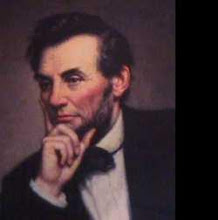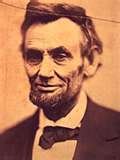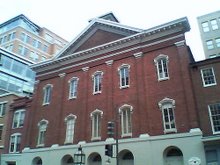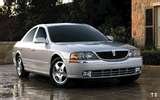 Lincoln's opinions of his own looks were self-effacing enough. Once during a campaign, when accused of being two-faced, Lincoln remarked "if I had two faces, do you think I'd be wearing this one?"
Lincoln's opinions of his own looks were self-effacing enough. Once during a campaign, when accused of being two-faced, Lincoln remarked "if I had two faces, do you think I'd be wearing this one?"But what did others think of Lincoln's face?
Poet Walt Whitman, often observing Lincoln on the streets of Washington, thought that the uniqueness of the President's face was never adequately captured with its "wonderful reserve, restraint of expression, fine nobility staring at you out of all that ruggedness..."
Democratic friend Orlando B. Ficklin recalled: "He could tell a story to make a group roar with laughter, but when his face was unlit by pleasantry it was dark, gloomy and peculiar. The pictures we see of him only half represent him, as they can only show him in repose."
Adjutant-General James B. Fry remarked: "His expression in repose was sad and dull; but his ever-recurring humor, at short intervals, flashed forth with the brilliancy of an electric light."
Biographer James G. Randall observed: "In Lincoln's eloquent face and in his manner of meeting there was the appeal of a friendly and magnetic personality."
Novelist Nathaniel Hawthorne, who visited the President in March 1862, said "the whole physiognomy is as coarse a one as you would meet anywhere in the length and breadth of the States; but, withal, it is redeemed, illuminated, softened, and brightened by a kindly though serious look out of his eyes, and an expression of homely sagacity, that seems weighted with rich results of village experience. A great deal of native sense; no bookish cultivation, no refinement; honest at heart, and thoroughly so, and yet, in some sort, sly."
Robert B. Stanton, who as a teenager often saw Lincoln at the White House, remarked about his features: "There was a something that came out from behind them, and spoke not in words, but shone and spoke through them by means of them, and turned them all into real beauty. And in all these moods, first or last, that spirit of beauty which I saw spread over his whole countenance and drew one to him as by the power of magic."
Want to hear more about Lincoln's face? Check out "Lincoln's beautiful face" at the Lincoln Classroom.












1 comment:
Love looks not with the eyes but with the mind, therefore is winged Cupid painted blind.
Any way you slice it, he was a total hottie!
Post a Comment